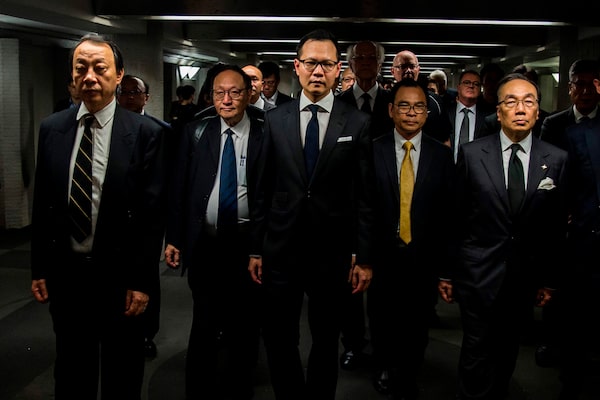
Lawmaker and lawyer Dennis Kwok, centre, marches with colleagues to the Central Government Offices in Hong Kong on June 6, 2019 to protest against the government's plans to approve extraditions with mainland China, Taiwan and Macau.ISAAC LAWRENCE/AFP/Getty Images
A prodemocracy Hong Kong lawmaker ousted from office by the Chinese government has moved to Canada with his family in hopes of starting a new life.
Dennis Kwok, who turns 43 next week, was born in Edmonton but relinquished his Canadian citizenship in order to enter public life in Hong Kong in 2012. He became an outspoken legislator who bucked against the Chinese Communist Party’s interventions in the former British colony. Last November, he was one of four politicians ousted from office for what Beijing deemed disloyalty to the regime.
Mr. Kwok now plans to begin the process of regaining his Canadian citizenship. The Globe and Mail will not identify where he is living or his travel route to Canada out of concern that he could be the target of retaliation from Chinese government agents.
The former Hong Kong legislator said he is grateful to be able to return. “Canada is my birth place. It is a great country that values human rights, democracy and rule of law,” Mr. Kwok said. “These are values we must all cherish.”
A crackdown on civil rights in Hong Kong that accelerated in 2020 amid the global pandemic has steadily eroded the territory’s political and social freedoms that were unique in China, a legacy of the territory’s years under British control. China had signed a treaty promising that Hong Kong could retain autonomy over its local affairs as well as civil rights for 50 years after the 1997 handover.
The measures, critics say, are remaking Hong Kong into something that is barely indistinguishable from other southern Chinese cities.
Conservative foreign affairs critic Michael Chong called on Canadian authorities to help Mr. Kwok regain his citizenship and set up a process for doing so that will not rely on certifications and documentation from Hong Kong. “The government needs to provide a path for those fleeing Hong Kong and seeking asylum in Canada that does not involve procuring the consent or documentation from Chinese authorities.”
Beijing’s clampdown includes a sweeping new national-security law that it imposed on Hong Kong last June. Ostensibly to target secession, subversion and terrorism, the law contains vaguely defined offences that critics say effectively criminalize dissent and opposition. About 300,000 Canadian citizens live in Hong Kong.
Authorities in Hong Kong have conducted sweeping arrests of most of the city’s remaining opposition figures and activists. And in March, the rubber stamp People’s Congress in Beijing finalized a sweeping overhaul of Hong Kong’s electoral system that drastically curbs democratic representation in the city as authorities seek to ensure “patriots” rule the global financial hub.
Mr. Kwok was ousted late last year after Beijing adopted a resolution allowing the city’s executive to expel lawmakers deemed to be advocating Hong Kong independence, colluding with foreign forces or threatening national security, without having to go through the courts.
A lawyer by trade, he was considered a moderate in Hong Kong and had not advocated for independence. In April, 2020, however, Chinese government offices responsible for overseeing Hong Kong lashed out at Mr. Kwok, accusing him of stalling tactics to hold up government business and singled out his opposition to a new Beijing law that criminalized mockery of China’s national anthem.
One of the leading experts on Hong Kong politics predicts that the massive changes Beijing is making to the former British colony will drive many to leave.
“The exodus will be significant in number,” said Steve Tsang, a Hong Kong-born political scientist at the University of London’s SOAS China Institute.
He said exiles will try to preserve as much of the “old Hong Kong” as they can when resettling abroad, even as China remakes the territory to suit its interests.
Prof. Tsang said there is a real risk that those dissidents who defended the Asian city’s civil rights and rule of law may be targeted by the Chinese Communist Party when they resettle in countries such as Canada. He estimates the likelihood that Beijing targets opposition figures abroad to be about 45 per cent.
“Any Chinese government before Xi Jinping I would say no,” he said. “It probably won’t happen but a 45-per-cent [chance] is incredibly, uncomfortably high if you happen to be the person concerned.”
The Conservative Party’s Mr. Chong said Canada must warn Chinese diplomats that any harassment of people such as Mr. Kwok will result in their expulsion.
“The government has yet to put in place a robust plan to counter China’s intimidation operations on Canadian soil. That plan should include making it clear to China’s accredited diplomats in Canada that any intimidation of anyone in Canada is grounds to be declared persona non grata.”
With reports from Reuters and Associated Press
Know what is happening in the halls of power with the day’s top political headlines and commentary as selected by Globe editors (subscribers only). Sign up today.
 Steven Chase
Steven Chase